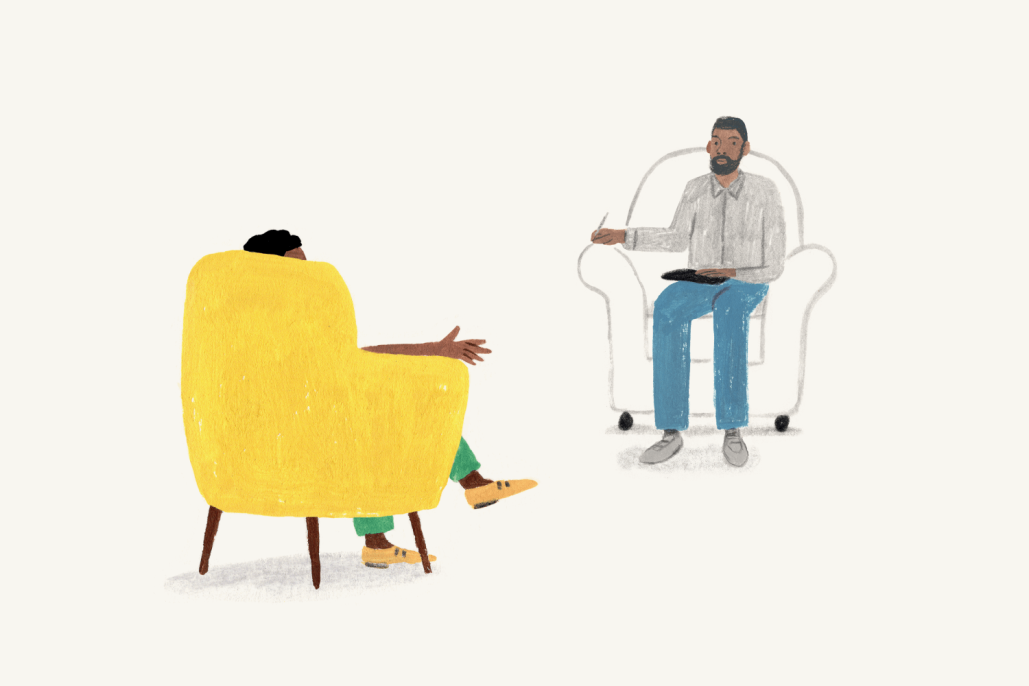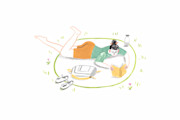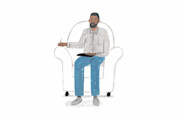You did it. You’ve found a therapist. You’ve scheduled your first therapy appointment. So now what? How do you prepare for therapy? Deciding to find help and support a therapist is no small matter—you’ve already jumped the tallest hurdle. Figuring out how to prepare for therapy is smart.
Below, we pulled together some tips and key info to help prepare for your first therapy session. Of course, step one is finding a therapist well-suited for your unique needs and goals.
To help make your search easier, on the Monarch Directory you can view therapists near you, and choose to filter them by their specialties and those therapists who accept your insurance. Many have online booking and offer free 15-minute consultations.

6 tips to prepare for your first therapy appointment
1. Everything in therapy is confidential
Trust is at the center of every therapist-patient relationship.
Key to that trust is knowing that everything you share in a session is confidential.
It will take time to feel completely comfortable sharing your innermost thoughts, feelings, and concerns, but it should help know that the therapy session is a safe space, whether it takes place in person, via a telehealth platform, or on the phone.
Therapists are required to abide by a strict code of conduct and social workers by a code of ethics in which trust, integrity, and confidentiality are paramount.
Before your first session, your therapist should share a privacy statement that details their privacy policies, how your information is recorded and/or stored, and the (rare!) instances that your information may be shared with anyone else.
These very limited exceptions to therapist-patient confidentiality include if a dangerous crime has been committed, or your therapist deems that someone is at risk of harm or self-harm.
Exceptions also apply with minors or those in the care of proxies or guardians. Even in that case, your therapist will require advance written permission from you to disclose anything to your designated health care proxy, be it a parent, partner, or other legal guardian.
So, while you might not divulge any serious secrets in your first session, knowing that you are in a safe space and that anything you do share will be treated with compassion and confidentiality is a first step towards not only building a healthy rapport with your therapist, but also towards a happier, healthier life.

2. Have a goal/outcome in mind for therapy
Reaching out to a therapist likely means there’s something you’d like to work out or work on in your life, your relationships, your mental health, or career.
While the reasons for seeking help are many, whatever your reason, it helps to have a specific outcome in mind.
What's your goal for therapy?
Do you want to stop taking work stress personally? Do you want to figure out a way to communicate with an estranged family member? Maybe you’re trying to get through grief, a loss, anxiety, or depression.
Your reason for seeking therapy can be broad (“I’m having trouble sleeping”) or acute (“I think I may be addicted to alcohol”) but it’s important to articulate these reasons as specifically as you can. Whatever the reason, be prepared to tell your therapist why you are seeking therapy, and what you hope to get out of the relationship.
Of course, the outcome you hope for likely will not happen overnight. But there are tools that your therapist can suggest to improve your daily interactions and the way you respond to difficult or disappointing situations.
With time, you should expect to check-in with your therapist on how you are progressing towards the initial goal or outcome you set at the beginning of treatment, and to adjust or update it as needed.
3. Limit distractions during your appointments
If you’re meeting with your counselor in person, it’s easier to remember to leave your cell phone off (or on silent).
On a telehealth therapy video meeting, limiting distractions can be a bit trickier. Try to make sure you’re somewhere quiet, private, and comfortable (your therapist will likely want to be sure you’re in a safe space, too).
Any stress or anxiety about your vulnerability will only be exacerbated if you’re tired or hungry, so try to get a good night's sleep the night before and ensure that you’ve eaten or had a snack in advance.
When meeting with your therapist via telehealth, it’s normal that your cat may jump into your lap, your neighbor’s dog may bark in the background, or your child may interrupt looking for a snack of their own.
This is totally okay, just know that the more time you spend apologizing for the interruption or going into an explanation, the less time you have to focus on the important stuff. Acknowledge the disruption, and move on—it’s not a big deal.

4. Bring a notebook and a pen/pencil (be prepared to both share AND to listen)
Many people think of a therapist as a kind of sounding board who will listen to their problems.
Less obvious to many is that therapists also use their own training—and judgement—to suggest solutions. Sometimes this is a new way of thinking about problems or responding to situations via exercises to “retrain” your brain, such as those used in Cognitive-Behavioral Therapy (CBT).
Your therapist may also suggest additional reading materials or even give you homework. Homework could be simply paying attention to the situations that cause your most vexing symptoms, and those that bring you joy.
Write these “assignments” down in your notebook so you can remember later; this will also help you to focus your attention in the moment on what your therapist might have to say.
Here are some additional items to bring to your first therapy appointment.

5. Meeting with a counselor doesn’t have to be weird
While it’s totally normal to be nervous when meeting a therapist for the first time, know that going to therapy is not unusual.
In a recent SimplePractice survey, 59% of people over the age of 18 have seen a counselor or therapist. It can be a comfort to know that you’re not alone in seeking help.
If you're feeling nervous, or awkward, try to commend yourself for having the courage to seek advice, counsel, or treatment.
Taking the time to center yourself before the session by focusing on your breath for a few moments—either in your car, the waiting room, or, if the session is via phone or telehealth video therapy, in a quiet solitary place in your home—can go a long way in helping to calm any nerves so you can stay present and focused during the session.

6. Give it at least a few visits before deciding if it’s the right fit
The first therapy session is typically part-administrative to review privacy policies, billing procedures, part-just getting to know one another.
Just like any relationship, it can take time for trust to develop.
For this reason, your therapist may keep things light for the first few sessions.
While you may not achieve your desired outcome or goal right away, you should start to feel a sense of relief that you are taking proactive steps towards feeling better overall.
Find a therapist near you
The Monarch Directory can help you to find a therapist nearby suited for your individual needs and goals.
Many have online booking and offer free 15-minute initial consultations, as well as telehealth video sessions.

Finally, browse therapists by insurance to find a provider who accepts your insurance.
READ NEXT: 13 Questions to Ask Your New Therapist
Need to find a therapist near you? Check out the SimplePractice Monarch Directory to find licensed mental health therapists with availability and online booking.
American Psychological Association (APA). (2017). Ethical principles of psychologists and code of conduct (2002, amended effective June 1, 2010, and January 1, 2017). Retrieved from https://www.apa.org/ethics/code/
National Association of Social Workers (NASW). (2018). NASW code of ethics. NASW. Retrieved from https://www.socialworkers.org/About/Ethics/Code-of-Ethics/Code-of-Ethics-English
APA Div. 12 (Society of Clinical Psychology). (2017). What is cognitive behavioral therapy? American Psychological Association (APA). Retrieved from https://www.apa.org/ptsd-guideline/patients-and-families/cognitive-behavioral
















